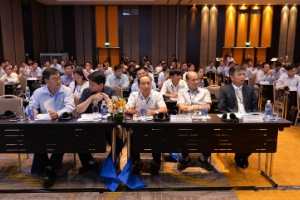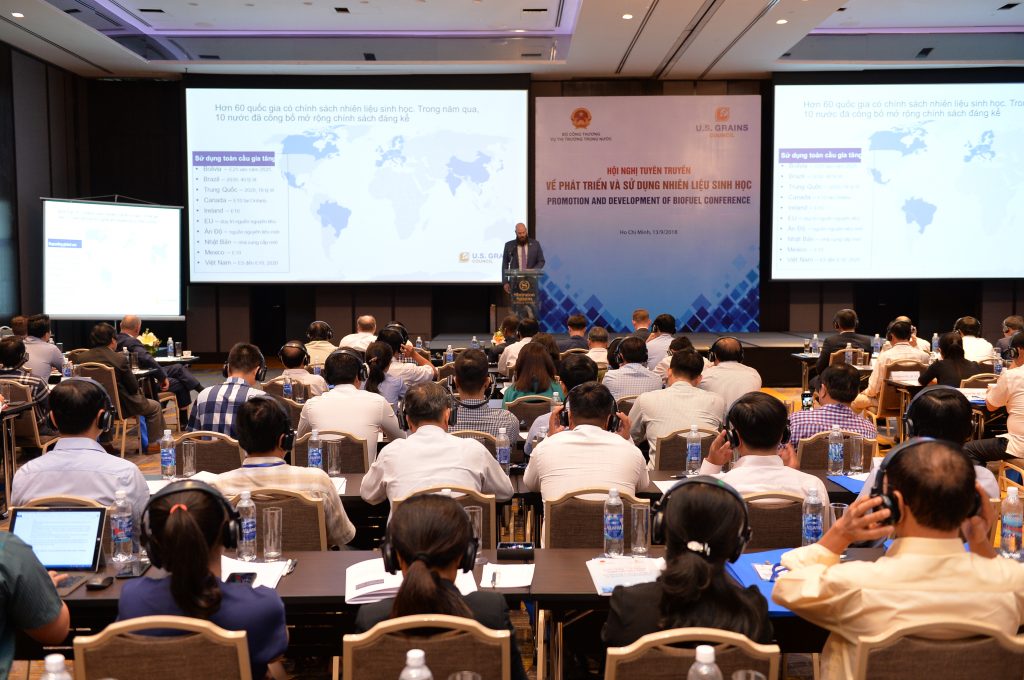Ethanol provides a win-win for domestic stakeholders in Vietnam and the U.S. ethanol industry, as discussed last week during the first U.S. Grains Council (USGC) biofuels conference conducted in the country.
The joint Vietnamese ministry and U.S. industry ethanol conference in Ho Chi Minh City shared information on the new ethanol policy in Vietnam, the advantages of increased ethanol usage and studies demonstrating ethanol marketing to consumers and environmental benefits.
More than 200 representatives participated, coming from stakeholder groups including the Vietnamese government’s ministries of finance and industry and trade, petroleum trading and petroleum distributors, private sector enterprises, the U.S. government and press.
The conference was a direct follow-up activity to the Ethanol Summit of the Asia Pacific in May, which included a post-tour to Nebraska for Vietnamese attendees.
“This successful event was a by-product of all the work we have collectively accomplished in promoting the expansion of global ethanol use,” said Manuel Sanchez, USGC regional director in Southeast Asia. “We are excited about Vietnam’s commitment to making the current E5 and the future E10 policy work.”
The conference is part of the Council’s work to support Vietnam’s trade-friendly policies as the government and industry are developing best practices to incentivize consumers at the pump and ethanol blenders to support increased ethanol use.
Vietnam is the fastest growing economy in Southeast Asia, thanks to a growing population, urbanization and rapid economic growth. Total gasoline consumption is expected to grow by nearly 15 percent by 2022 as Vietnam’s rising middle class takes advantage of different transportation options with large numbers of motor scooters and more and more cars on the road.
To fuel those vehicles, Vietnam started offering E5 on Jan. 1, with a goal to move to E10 by 2020. This new policy allows for two options at the pump – E5 and E0 – and roughly half of consumers are choosing to fuel up with E5.
“The collaboration between U.S. and Vietnamese stakeholders includes work to highlight the importance of having octane in both options at the pump,” Sanchez said. “Doing so ensures ethanol’s octane advantages are fully captured and environmental benefits fully realized, which will be even more important as Vietnam introduces E10.”
The Vietnamese ethanol industry expects to source some of the ethanol needed to fulfill these mandates domestically from local cassava producers. However, the government and industry are open to importing ethanol should domestic producers fall short on feedstock needed to fulfill the mandate, as ethanol plants come back online or as feedstock prices fluctuate.
A decade ago, Vietnam initiated a biofuels policy that largely was unsuccessful due to a lack of price differentiation at the pump between E0 and ethanol-blended fuel, which has since been addressed. Continued success in Vietnam will include offering ethanol in all grades of gasoline at E5 in 2018 and 2019 and moving to E10 in 2020.
The Council’s work there – in partnership with domestic ethanol industry partners – is already starting to pay off in sales as the Vietnamese fuel industry expands. After importing no U.S. ethanol for the last four marketing years, Vietnam has imported about three million gallons in the 2017/2018 marketing year to date (September 2017-July 2018), including product transshipped through South Korea.
By 2020, Vietnam could represent a 225 million gallon ethanol market at an E10 blend rate, equivalent to roughly 80 million bushels of corn.
“The U.S. industry remains committed to supporting Vietnam and other countries in the region to develop their own ethanol policies that allow a role for trade,” Sanchez said. “These efforts include capacity building and direct industry and government engagement.”
Learn more about the Council’s work on ethanol in Southeast Asia here.
About The U.S. Grains Council
The U.S. Grains Council develops export markets for U.S. barley, corn, sorghum and related products including distiller’s dried grains with solubles (DDGS) and ethanol. With full-time presence in 28 locations, the Council operates programs in more than 50 countries and the European Union. The Council believes exports are vital to global economic development and to U.S. agriculture’s profitability. Detailed information about the Council and its programs is online at www.grains.org.


